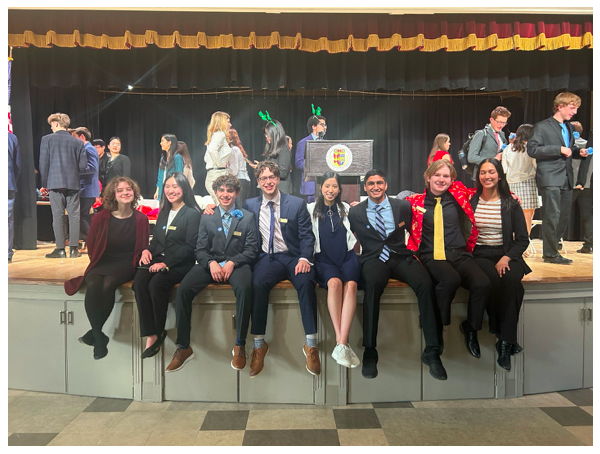NEWS
More than 500 students came to the St. John University campus in Pittsford on March 8 for the 2024 Model UN sponsored by UNAR. Erin Moses, the conference coordinator, reported that the number of attendees may be the largest number ever. Just as important, those attending gave the gathering high marks. “UNAR is a truly fantastic conference,” said Javier Benzan, a senior at Brockport High School and one of the conference leaders.
“UNAR is a truly fantastic conference,” said Javier Benzan, a senior at Brockport High School and one of the conference leaders.
“From start to finish, it immerses delegates in an enriching experience that engages them mentally and socially. It inspires delegates to become better public speakers, leaders, and people. In many ways, UNAR changed my life, and for that I will be forever grateful.”
In all 38 schools were represented at the conference. Most were from the Rochester area, but several delegations came from the Syracuse and Utica areas, and Ithaca High School sent a delegation, as well.
 They represented more than 70 countries, debating as if they were delegates from those countries. The attendees also contributed more than $4,000 for the Veterans Outreach Center in Rochester. A representative from the center spoke at the end of the day on Saturday. Delegates will return to St. John Fisher on March 7 and 8, 2025, for next year’s conference.
They represented more than 70 countries, debating as if they were delegates from those countries. The attendees also contributed more than $4,000 for the Veterans Outreach Center in Rochester. A representative from the center spoke at the end of the day on Saturday. Delegates will return to St. John Fisher on March 7 and 8, 2025, for next year’s conference.
Left to right: Ivy Bergin, Maureen Zhang, Javier Benzan, Robert McCann, Annie Guo, Arjun Patel, Django Paine, and Ananya Bobbala.
Model UN 2023: “A Resounding Success”
More than 500 delegates attended the 2023 Model UN Conference held March 10 and 11, 2023, at St. John Fisher University.
Sponsored by the United Association of Rochester, it was the 51st gathering for high school students, who represent different countries and deliberate on issues affecting the world.
Here’s the thoughts about the conference, and about Model UN in general, from three of the student leaders:
Maureen Zhang, a junior at Pittsford Sutherland High School:
 This year’s Model UN was a resounding success, with attendance up to pre-pandemic levels and productive committees filled with passionate delegates engaging in conversation on current issues and international policy.
This year’s Model UN was a resounding success, with attendance up to pre-pandemic levels and productive committees filled with passionate delegates engaging in conversation on current issues and international policy.
The amazing keynote speaker, Dr. Michael Mendoza, delivered an inspiring speech that motivated delegates to make a difference in the world beyond the conference.
Ananya Bobbala, a junior at Webster Thomas High School:
I initially joined Model UN because I liked debate and politics. I continue to do Model UN because of the incredible people I meet at each conference.
Model UN created an environment where I could interact with people of many different walks of life which helped expand my understanding of the world. Now, I can’t imagine what my life would be like without Model UN or the people I met through it.
Ivy Bergin, a junior at Brighton High School:
I’ve had many incredible experiences in Model UN, but the most memorable moments are likely the sharing of big achievements.
At the Hilton Conference of 2022, I recall sitting in the audience during closing ceremony and watching several of my friends and colleagues receive awards – at that moment, I felt so much joy and excitement for the achievements that I knew my friends had worked hard for.
On November 30th, 2021, we have the opportunity to support the most pressing causes around the world. Giving Tuesday is a day where individuals can donate to non-profits and charities in their communities and elsewhere to make a true difference. Created in 2012, Giving Tuesday was conceived for one simple reason: to encourage people to support nonprofits around the world. There are thousands of organizations across the United States and the world who need support to continue their fight, and Giving Tuesday is the perfect opportunity to help!
The United Nations Association of Rochester is a nonprofit who supports the values of the United Nations and reflects them in the Rochester, NY community. Through community engagement, newsletters, events and internships, the U.N.A.R. is actively working to better our city.
Funding for the U.N.A.R. is imperative to continue to support our community engagement and involvement in one of the most at need regions in the United States. Our funding goes directly to programs such as our Model U.N. competition that engages hundreds of high school students annually. In order to keep our engagement with our youth and encourage them to reflect the values of the United Nations, we need continual support from our community,
If you are interested in donating, please visit unar.org for more information!
 The planet is sick and so are its people. Children are starving without clothing or shelter. Neighbors are not helping neighbors either! Plants and animals are at risk. What can the US do? Where is the United Nations organization at this time?
In reality, the UN is like our primary care medical model. Specific methods and departments are designed to create and facilitate needed steps toward diagnosis, treatment and help. However, the humans, services and governments involved let problems escalate, using band aids, when surgery is required! Frequently, we seek a quick fix because we believe it is cheaper. “No one else cares anyway. It is not my responsibility. I won’t get re-elected if I point out these problems.”
Around the world today there are many national disasters! Lebanon is in free fall, banks collapsing and there is nowhere to go. Myanmar families are hiding in the forest of a neighboring country, no shelter, food or future. On the US southern border, desperate Haitian families are willing to sacrifice everything to gain entry to a possible economic and safe future for their children.
Like an untreated sore, these problems become infected. Who is to blame? We cannot do it alone. We need cooperation, experts with specific skills and action planning.
The UN organization has nine departments, including Economics, Trade, and Human Settlement. These departments can help with prevention, planning and encouraging neighbors to work together. The Nation State Members must identify the problem and ask for the UN to intervene. Is the need for clean water, environmental issues, space, feeding and educating children? The UN treatments are available to its 193 Members.
The most familiar treatments for national problems or conflicts are: isolation, defense, regulations and war.
UN Member States have diplomats, education and medical systems, scientists, researchers, planners and nutritionists who often are not being consulted. Many times, finding solutions is based on blaming, accusing and conflict. Funding peaceful, educated and cooperative solutions takes time, buy-in and is not instant.
In the US, a Member State of the UN, we are struggling with funding education, childcare, climate control, infrastructure, the welfare of our neighbors, medical research and fundamental healthcare. However, we rarely struggle over the military budget!
This UN Day could be dedicated to the Treatments of Peace, the real-life actions of our daily choices, behaviors and elected officials.
Happy 76th Birthday United Nations!
Margaret Corbin – UNAR Board Member
The planet is sick and so are its people. Children are starving without clothing or shelter. Neighbors are not helping neighbors either! Plants and animals are at risk. What can the US do? Where is the United Nations organization at this time?
In reality, the UN is like our primary care medical model. Specific methods and departments are designed to create and facilitate needed steps toward diagnosis, treatment and help. However, the humans, services and governments involved let problems escalate, using band aids, when surgery is required! Frequently, we seek a quick fix because we believe it is cheaper. “No one else cares anyway. It is not my responsibility. I won’t get re-elected if I point out these problems.”
Around the world today there are many national disasters! Lebanon is in free fall, banks collapsing and there is nowhere to go. Myanmar families are hiding in the forest of a neighboring country, no shelter, food or future. On the US southern border, desperate Haitian families are willing to sacrifice everything to gain entry to a possible economic and safe future for their children.
Like an untreated sore, these problems become infected. Who is to blame? We cannot do it alone. We need cooperation, experts with specific skills and action planning.
The UN organization has nine departments, including Economics, Trade, and Human Settlement. These departments can help with prevention, planning and encouraging neighbors to work together. The Nation State Members must identify the problem and ask for the UN to intervene. Is the need for clean water, environmental issues, space, feeding and educating children? The UN treatments are available to its 193 Members.
The most familiar treatments for national problems or conflicts are: isolation, defense, regulations and war.
UN Member States have diplomats, education and medical systems, scientists, researchers, planners and nutritionists who often are not being consulted. Many times, finding solutions is based on blaming, accusing and conflict. Funding peaceful, educated and cooperative solutions takes time, buy-in and is not instant.
In the US, a Member State of the UN, we are struggling with funding education, childcare, climate control, infrastructure, the welfare of our neighbors, medical research and fundamental healthcare. However, we rarely struggle over the military budget!
This UN Day could be dedicated to the Treatments of Peace, the real-life actions of our daily choices, behaviors and elected officials.
Happy 76th Birthday United Nations!
Margaret Corbin – UNAR Board Member
Known for is sparse population and cold temperatures, Greenland is becoming a big player in the future of energy in the eyes of many of the world powers
After a UN report showed that humanity is at a code red in the climate crisis, world powers have been increasingly competitive with one an other in the quest for resources to fuel green economies and lifestyles. Many industrialized countries are seeking to revolutionize sectors such as the auto industry in order to reduce their carbon footprint.
As rising temperatures continually melt the ice that covers much of Greenland’s terrain, the world powers are looking towards the island to mine many hard to access resources that are known to be found in Greenland that can be used to further their green revolution.
Many of the rare earth metals needed to fuel a green economy, such as neodymium and dysprosium, are monopolized by China, but abundantly found in Greenland.
However, the President of Greenland, Marianne Paviasen, has been wary about world powers trying to exploit the resources.
During former American President Donald Trump’s term in office, he had met with leaders from Denmark and Greenland about buying the largest island on earth. However, a deal could not be made. Officials in Greenland have repeatedly talked about fair cooperation with the United States and other powers, but have been adamant about maintaining their current political situation.
Greenland has already been suffering from the effects of climate change, and fear the increased environmental damage that exploitation’s by the world powers could bring.
The world will convene in Glasgow in late October for an International Climate Convention to evaluate and adjust past climate objectives.
-Colin Witman, UNAR News Team
Taking action against climate change! The United Nations encourages young people to use their voices and speak up. Young people serve as important social drivers to help combat climate change. The Secretary General of the United Nations described the climate change crisis as “code red for humanity”. Young people have been speaking up about climate change and this is a great victory for our planet!
There are many ways that we all can get involved to help protect our planet. Reuse, Recycle, Reduce are three actions that we can take in our daily lives. Additional methods include a greener commute, consuming less in terms of fossil fuels as well as everyday resources such as food waste, clothing, etc.
Educating ourselves about ways in which we can support the environment and encouraging friends and family to do the same will truly help make a difference. Furthermore, we can make sure to register to vote and vote for candidates that care about our planet. No action is too small and everyone can work together to make a safer Earth for future generations.
https://news.un.org/en/story/2021/09/1101712
https://davidsuzuki.org/what-you-can-do/top-10-ways-can-stop-climate-change/
By: Pema Lama – UNAR News Team
The nation of Haiti continues to face a severe crisis involving natural disasters, gang violence and the Covid-19 pandemic. Haiti is one of the poorest countries in the western hemisphere and they have always been dealing with issues regarding poverty, political problems and economical issues. Recently in the past month, the nation was hit with a 7.2 magnitude earthquake and then the storm “Tropical Storm Grace” and this caused many damages to the community. This disruption caused many Haitain families to flee the country and head towards Mexico with the goal of eventually entering the United States.
A lot of the migrants have been sent back home after attempting to enter through the Texas borders. The border control has been aggressively blocking the migrants and many are being sent back to the dangerous conditions that they tried to initially escape. The U.S special envoy for Haiti resigned in protest to the deportation of the migrants. You can read more about the UN’s response in the article attached below:
https://news.un.org/en/story/2021/09/1100972
By: Pema Lama – UNAR News team
 Early on Tuesday September 21st, President Joe Biden made his speech at the 76th United Nations General Assembly.
The U.N.G.A. is an annual summit held in New York City where heads of state of all U.N. recognized countries come together to discuss the pressing issues of the world.
Prior to the President’s speech, he reported to the media that his administration would be shifting from a “period of relentless war,” to “a new area of relentless diplomacy.”
These comments from the President come after straining relations with the United States and global counterparts. The President has overseen a chaotic withdrawal from Afghanistan, tensions with China, and a new rift between the United states and France over the AUKUS submarine deal with Australia and the United Kingdom.
At the General Assembly, the President spoke on his new approach to foreign policy, alongside the ongoing COVID pandemic. The United States has received criticism over the past few weeks as they have announced that a portion of the population can receive a third booster shot, when many underdeveloped countries have limited access to any shots at all.
The President is set to host a COVID-19 summit on Monday September 27th on the margins of the General Assembly. He plans to present his vision of a unified strategy to defeat COVID-19 and become better prepared for the future of global health.
-Colin Witman, UNAR News Team
Early on Tuesday September 21st, President Joe Biden made his speech at the 76th United Nations General Assembly.
The U.N.G.A. is an annual summit held in New York City where heads of state of all U.N. recognized countries come together to discuss the pressing issues of the world.
Prior to the President’s speech, he reported to the media that his administration would be shifting from a “period of relentless war,” to “a new area of relentless diplomacy.”
These comments from the President come after straining relations with the United States and global counterparts. The President has overseen a chaotic withdrawal from Afghanistan, tensions with China, and a new rift between the United states and France over the AUKUS submarine deal with Australia and the United Kingdom.
At the General Assembly, the President spoke on his new approach to foreign policy, alongside the ongoing COVID pandemic. The United States has received criticism over the past few weeks as they have announced that a portion of the population can receive a third booster shot, when many underdeveloped countries have limited access to any shots at all.
The President is set to host a COVID-19 summit on Monday September 27th on the margins of the General Assembly. He plans to present his vision of a unified strategy to defeat COVID-19 and become better prepared for the future of global health.
-Colin Witman, UNAR News Team On Wednesday September 23, 2021, President Joe Biden hosted a summit with world leaders to discuss a unified plan to defeat COVID-19 and prepare the world for the future of global health. This summit comes on the margins of the United Nations 76th General Assembly.
Wednesday’s virtual summit looks to expand and enhance shared efforts to defeat COVID-19 and build on past gatherings of world leaders to pursue a global strategy and common vision for all states to follow. The meeting will ask participants to commit to a higher level of ambition across four themes: Vaccinate the World, Save Lives Now, Build Back Better, and Calling the World to Account.
The summit was not a pledging event, but the President did call on businesses, governments, non-government organizations and philanthropists to do their part in defeating the virus.
The emphasis on the summit is on wealthier countries sharing financial means, resources and vaccines with countries who have less access.
However, the Biden administration has recently been criticized for claiming that wealthier countries need to distribute, while allowing the elderly population in the United States to receive a third shot, at the same time as underdeveloped countries have limited access to any shots.
In response, the President announced at the summit that the United States had purchases an additional $500 million doses of the Pfizer vaccine to donate overseas to underdeveloped countries.
Vice President Kamala Harris also announced the United States would donate 250 million dollars to a new global fund that intends to raise $10 billion dollars to prevent future pandemics.
The President’s COVID summit, further criticized for its low attendance, amongst world leaders comes at a time when global COVID cases are surging back towards daily all-time highs.
-Colin Witman, UNAR News Team
On Wednesday September 23, 2021, President Joe Biden hosted a summit with world leaders to discuss a unified plan to defeat COVID-19 and prepare the world for the future of global health. This summit comes on the margins of the United Nations 76th General Assembly.
Wednesday’s virtual summit looks to expand and enhance shared efforts to defeat COVID-19 and build on past gatherings of world leaders to pursue a global strategy and common vision for all states to follow. The meeting will ask participants to commit to a higher level of ambition across four themes: Vaccinate the World, Save Lives Now, Build Back Better, and Calling the World to Account.
The summit was not a pledging event, but the President did call on businesses, governments, non-government organizations and philanthropists to do their part in defeating the virus.
The emphasis on the summit is on wealthier countries sharing financial means, resources and vaccines with countries who have less access.
However, the Biden administration has recently been criticized for claiming that wealthier countries need to distribute, while allowing the elderly population in the United States to receive a third shot, at the same time as underdeveloped countries have limited access to any shots.
In response, the President announced at the summit that the United States had purchases an additional $500 million doses of the Pfizer vaccine to donate overseas to underdeveloped countries.
Vice President Kamala Harris also announced the United States would donate 250 million dollars to a new global fund that intends to raise $10 billion dollars to prevent future pandemics.
The President’s COVID summit, further criticized for its low attendance, amongst world leaders comes at a time when global COVID cases are surging back towards daily all-time highs.
-Colin Witman, UNAR News TeamAs the Taliban has started taking over, the humanitarian crisis in Kabul, Afghanistan, has arisen the essential food problem to be part of the struggle. More than 90% of the families do not have access to stable food resources. Children are vulnerable to the circumstance in which the majority of under-fives are experiencing severe malnutrition.
The World Food Programme (WFP) is facing the potential shortage of food stocks by the end of September. The prevention of involving Afghanistan into a worse humanitarian catastrophe requires “necessary steps to provide essential items which this country needs right now,” said Mr. Alabarov, Deputy Special Representative and Humanitarian Coordinator in Afghanistan.
The WFP-led Humanitarian Air Service (UNHAS) stepped into operation after reopening the air link to Kabul to assist people with food and avoid hunger issues. WFP had taken care of “6.4 million people,” including pregnant and breastfeeding women and young children in urgent treatment for malnutrition. UN remains “determined to deliver” while Afghanistan needs constant food support.
By Tasia, UNAR news team
More than $1Billion pledged to Afghanistan from the UN.
Afghanistan is in deep trouble right now and needs massive amounts of support. For years, people living in Afghanistan have faced many issues, but the current situation is described to be “their most perilous hour”.
There is an estimate that nearly one million children could die during this “perilous hour”. One in three Afghans do not know where their next meal is coming from. In addition, many more are at risk of running out of food supply by the end of the year. 
U.S. soldiers stand guard as Afghan people wait to board a U.S. military aircraft to leave Afghanistan, at the military airport in Kabul on August 19, 2021, after Taliban’s military takeover of Afghanistan. (Photo by Shakib RAHMANI / AFP)
Almost 600,000 people (half of them children) are displaced from their homes and the problem only continues to grow. Other major issues concerning Afghans involve conflicts regarding human rights, woman’s safety, ethnic and religious communities’ safeties.
The United Nations has pledged $1 Billion to the people of Afghanistan to assist with initiatives such as Equal Education, protecting girls and women, and saving rural livelihoods.
https://news.un.org/en/story/2021/09/1099732
https://www.nytimes.com/2021/09/13/world/asia/afghanistan-united-nations-crisis.html
By Pema, UNAR news team
 United States President Joe Biden met with Mexican President Andres Manuel Lopez Obrador to resume the dormant High Level Economic Dialogue (HLED) in order to advance the economic relationship between the U.S. and Central America.
The talks between leaders come in anticipation of a post-COVID-19 world where U.S. and Central American trade will remain vital.
US embassies and consulates in Mexico
Throughout the COVID-19 pandemic, both the United States and Mexico experienced commercial difficulties through supply chain disruptions and communication failures. The High Level Economic Dialogue platform seeks to fix these issues and bring an increased amount of prosperity to Central America.
Then Vice President Joe Biden launched the HLED platform in 2013 to be a goal-setting initiative that allowed for quantifiable and measurable results in order to track progress on various commercial, economic, labor and trade-related issues.
However, former President Donald Trump’s administration left the platform dormant, instead focusing efforts on the reformation of NAFTA into the USMCA agreement.
Now, under the Biden administration, the platform has been revived and updated since its original formatting 8 years ago. The new platform includes four pillars seeking to build back better, promote sustainable development in Central America, securing future prosperity, and finally investment in small and medium-sized firms.
The updated pillars stress the need to address the commercial opportunities of the 21st century. An increased emphasis on the improvement of supply chain infrastructure- including ports and other facilities- and cyber security address modernization.
“This dialogue drives improved job creation, global competitiveness and reductions in poverty and inequalities, and that is to the benefit of U.S. citizens and Mexican citizens alike,” claims U.S. State Department spokesperson Ned Price.
On Tuesday, September 14th, Mexico has suggested interest in producing semiconductors in their southern states in order to boost commercial activity.
By Colin Witman, UNAR news team
United States President Joe Biden met with Mexican President Andres Manuel Lopez Obrador to resume the dormant High Level Economic Dialogue (HLED) in order to advance the economic relationship between the U.S. and Central America.
The talks between leaders come in anticipation of a post-COVID-19 world where U.S. and Central American trade will remain vital.
US embassies and consulates in Mexico
Throughout the COVID-19 pandemic, both the United States and Mexico experienced commercial difficulties through supply chain disruptions and communication failures. The High Level Economic Dialogue platform seeks to fix these issues and bring an increased amount of prosperity to Central America.
Then Vice President Joe Biden launched the HLED platform in 2013 to be a goal-setting initiative that allowed for quantifiable and measurable results in order to track progress on various commercial, economic, labor and trade-related issues.
However, former President Donald Trump’s administration left the platform dormant, instead focusing efforts on the reformation of NAFTA into the USMCA agreement.
Now, under the Biden administration, the platform has been revived and updated since its original formatting 8 years ago. The new platform includes four pillars seeking to build back better, promote sustainable development in Central America, securing future prosperity, and finally investment in small and medium-sized firms.
The updated pillars stress the need to address the commercial opportunities of the 21st century. An increased emphasis on the improvement of supply chain infrastructure- including ports and other facilities- and cyber security address modernization.
“This dialogue drives improved job creation, global competitiveness and reductions in poverty and inequalities, and that is to the benefit of U.S. citizens and Mexican citizens alike,” claims U.S. State Department spokesperson Ned Price.
On Tuesday, September 14th, Mexico has suggested interest in producing semiconductors in their southern states in order to boost commercial activity.
By Colin Witman, UNAR news team The Taliban has begun to violently crack down on protests throughout Afghanistan since taking control of Kabul on August 15th, 2021.
The UN has condemned the Taliban for violating basic human rights and using violence against protesters.
“We call on the Taliban to immediately cease the use of force towards, and the arbitrary detention of those exercising their right to peaceful assembly and the journalists covering the protests,” stated a spokeswoman for the UN High Commissioner for Human Rights in a statement late last week.
Reuters
The statement comes as a response to reports of the Taliban using batons, whips, and gun fire to disperse and intimidate the protesters, along with four protesters reported dead, including a young boy. The UN also reported an increased amount of violence and aggression towards journalists and reporters covering the widespread protests.
On Wednesday September 8th, the Taliban banned unauthorized protests and the following day demanded that telecommunications companies shut down mobile internet throughout Afghanistan.
The strict lack of tolerance for protests directly violates international human rights law Article 21 of the International Covenant on Civil and Political Rights, where the state must recognize the right to peaceful protests.
The UN further reported that 93%of households in Afghanistan do not have enough food to eat, and about 75% of families have reduced portion sizes or have been forced to burrow food.
The increased use in force and deterrence towards protesters comes after the United States and NATO security forces fully withdrew from the country on August 31st, leaving the Taliban in Afghanistan unopposed by foreign fighters.
-Written by Colin Witman, UNAR news team.
The Taliban has begun to violently crack down on protests throughout Afghanistan since taking control of Kabul on August 15th, 2021.
The UN has condemned the Taliban for violating basic human rights and using violence against protesters.
“We call on the Taliban to immediately cease the use of force towards, and the arbitrary detention of those exercising their right to peaceful assembly and the journalists covering the protests,” stated a spokeswoman for the UN High Commissioner for Human Rights in a statement late last week.
Reuters
The statement comes as a response to reports of the Taliban using batons, whips, and gun fire to disperse and intimidate the protesters, along with four protesters reported dead, including a young boy. The UN also reported an increased amount of violence and aggression towards journalists and reporters covering the widespread protests.
On Wednesday September 8th, the Taliban banned unauthorized protests and the following day demanded that telecommunications companies shut down mobile internet throughout Afghanistan.
The strict lack of tolerance for protests directly violates international human rights law Article 21 of the International Covenant on Civil and Political Rights, where the state must recognize the right to peaceful protests.
The UN further reported that 93%of households in Afghanistan do not have enough food to eat, and about 75% of families have reduced portion sizes or have been forced to burrow food.
The increased use in force and deterrence towards protesters comes after the United States and NATO security forces fully withdrew from the country on August 31st, leaving the Taliban in Afghanistan unopposed by foreign fighters.
-Written by Colin Witman, UNAR news team.I am writing to you all about Anshu Sharma’s personal experience during the COVID pandemic in India. Sharma works for the UN News Hindi service from New Delhi. In the spring of 2020, a family member of hers “passed away due to a delay in treatment caused by an overwhelmed and panic-stricken health service.” Soon thereafter, Sharma’s cousin died in the hospital. A few months went by and Sharma visited her mother and brother. They all got the virus.
By the end of 2020, COVID cases began to drop in India. India was ready to start the “world’s largest vaccination campaign.” Everything was opening up again.
And then the second wave struck India. Three of Sharma’s family members got the virus. At present, the number of new infections is over 300,000 per day; at least 200,000 people have died from COVID. Many places are under curfew. Health workers are battling COVID, 24/7. “This pandemic has brought this country of 1.3 billion people to its knees.”
But there are some positives to this evil virus, Anshu says: “Neighbors are supporting each other, shopkeepers are delivering goods to those in need, places of worship are being converted into isolation centers to meet the shortage of hospital beds, and local community halls are collecting money and arranging oxygen concentrators.” On that note, ‘help source, fund, and supply essential life-saving equipment like oxygen concentrators, RT-PCR testing machines, PPE kits, and oxygen generation plants’ in India, if you can. To do so, you can visit this link: https://help.unicef.org/in/covid-critical-supplies
SUPPORT UNAR
MANY THANKS TO OUR SPONSORS










